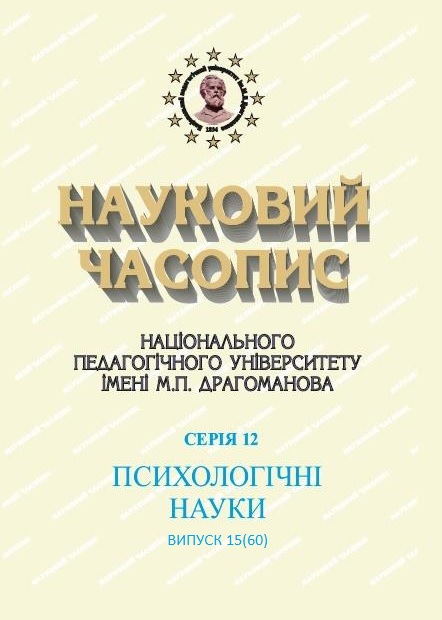PERSONAL AND PROFESSIONAL MATURITY AS A PSYCHOLOGICAL CONDITION FOR FORMATION OF THE COMMUNICATIVE COMPETENCE OF FUTURE SPEECH THERAPIST
DOI:
https://doi.org/10.31392/NPU-nc.series12.2021.15(60).04Keywords:
communicative competence, structure of communicative competence, personal maturity, personal-professional maturity, psychological conditions, formation, future speech therapist.Abstract
The article covers the study of personal and professional maturity of future speech therapist as a psychological condition to form communicative competence. Scientific approaches to the study of maturity concepts, “personal maturity”, “professional maturity”, “communicative competence” and its structure are analyzed. It was found that a personal and professional maturity are the components of personal-professional maturity of future specialists, who have the vital and civic position, are able to accept themselves and unconditionally the others, quickly adapt to the demands of the profession and society strives for performance and professional growth. Research methods: Theoretical (analysis, comparison and systematization of psychological sources), empirical (testing, psychological and pedagogical experiment) and mathematical (Spearman’s and Pearson’s correlation coefficient) methods were used to solve the goal and tasks. A set of complementary psychodiagnostic methods was used to study the peculiarities of the development components of communicative competence and to determine personal-professional maturity as a psychological condition for its formation. Results. The psychological features of the development of the structural components of the future speech therapist communicative competence are revealed, its levels of development are determined. The psychological condition of its formation - personal and professional maturity - is theoretically determined and experimentally tested. There is a positive correlation between the levels of development of communicative competence and personal-professional maturity, which is evidence of its positive impact on the formation communicative competence. Conclusions. While studying in higher institutions, the communicative competence of the future speech therapist is not developed enough, and the condition for its increase is personal and professional maturity, as a characteristic of a person who has a certain life and civic position, able to accept themselves and unconditionally accept the others and society, striving for self-realization and professional growth.
References
- Hylbukh, Yu.Z. (1995). Test-oprosnyk lychnostnoi zrelosty [Personal maturity test questionnaire]. Kyiv : NPTs Perspektyva [in Russian].
- Didyk, N.M. (2014). Fenomen osobystisnoi zrilosti v interpretatsii ukrainskykh doslidnykiv [The phenomenon of personal maturity in the interpretation of Ukrainian researchers]. Molodyi
vchenyi – A young scientist, 1, 128–131 [in Ukrainian]. - Dolynska, L. (2019). Osobystisna zrilist yak chynnyk formuvannia psykholohichnoi kultury maibutnoho fakhivtsia [Personal maturity as a factor in shaping the psychological culture of the future specialist]. Zbirnyk naukovykh prats “Problemy suchasnoi psykholohii” – Collection of scientific works “Problems of modern psychology”, (16). https://doi.org/10.32626/2227-6246.2012-16.%p [in Ukrainian].
- Druzhilov, S.A. (2003). Psihologija professionalizma cheloveka: integrativnyj pohod [Psychology of human professionalism: an integrative approach]. Zhurnal prikladnoj
psihologii – Journal of Applied Psychology, 4–5, 35–42 [in Russian]. - Nemov, P.C. (1995). Obshhie osnovy psihologii [General foundations of psychology]: posobie. Moscow : Prosveshhenie: VLADOS [in Russian].
- Petrovskij, A.V., & Jaroshevskij, M.Ja. (1990). Psihologija [Psychology]: Moscow : Politizdat [in Russian].
- Rean, A.A. (1999). Psihologija izuchenija lichnosti [Psychology of the study of personality]: posob. Saint Peterburg : Izd-vo Mihajlova V.A. [in Russian].
- Temruk, O.V. (2005). Osoblyvosti rozvytku osobystisnoi zrilosti maibutnoho vchytelia na pochatkovomu etapi profesiinoi pidhotovky [Features of the development of personal maturity of the future teacher at the initial stage of training]. Naukovyy chasopys NPU
imeni M.P. Drahomanova. Seriya 12. Psykholohichni nauky – Scientific Journal of National Pedagogical Dragomanov University. Series 12. Psychological Sciences, 4(28), 116–122 [in Ukrainian]. - Tsyna, V. (2014). Sutnist, struktura, osoblyvosti osobystisno-profesiinoi zrilosti maibutnoho vchytelia [The essence, structure, features of personal-professional maturity of the future teacher]. Vytoky pedahohichnoi maisternosti – Origins of pedagogical skills, 14, 305–310 [in Ukrainian].
- Shtepa, O.S. (2004). Proprium zriloi osobystosti [Proprium of a mature person]. Praktychna psykholohiia ta sotsialna robota – Practical Psychology and Social Work, 2, 26–35 [in Ukrainian].
- Coban, A.S. (2005). Predictor of levels of vocational maturity of high school students study some of the variables. Journal of Inonu University Faculty of Education, 6(10), 39–54.
- Greene, J.O. (2016). Communication skill and competence. Oxford Res Encyclop Comm. doi: 10.1093/acrefore/9780190228613.013.158.

